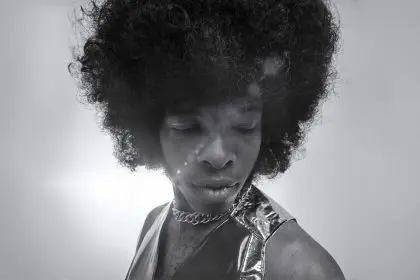In the annals of pop music, certain artists are more than just innovators and more than just icons. Certain artists are avatars —the manifestation of an idea. In the case of Sylvester Stewart, better known as legendary pop-funk-rock star Sly Stone; he represented the living manifestation of the idea of pop star-as-idiosyncratic-artist. In the late 1960s, popular music had undergone a radical shift. The British Invasion had driven rock bands to the forefront and the LP had become the vehicle by which artists communicated complex ideas that elevated the art form. In 1965 and 1966, James Brown had unleashed a hard-driving, groove-centered approach to his traditional soul sound and in doing so invented the blueprint for funk music.
It was into this heady mix that Sly & the Family Stone emerged.
Young Sylvester came from a devoutly religious background and he and his siblings had performed as “The Stewart Four” as youngsters, before he gained work as a musician, producer and disc jockey (under his new moniker of ‘Sly Stone’) in the Bay Area throughout the 1960s. By 1966, Stone had formed his own band; as had his brother, Freddie. At the suggestion of a mutual friend, the two brothers joined forces and recruited their sister Vaette and her high school friends to sing backup. They christened this new group “Sly & the Family Stone.”
Beginning with the Motown-influenced “Dance to the Music,” Sly & the Family Stone became one of the most popular bands of the late 1960s. Building on James Brown’s sonic template, Sly developed funk into the sound we know best today and the Family Stone were unofficially the first, real funk band — paving the way for Parliament, the Commodores, the 70s incarnation of the Isley Brothers and Earth, Wind & Fire.
 The band’s breakthrough album, 1969s Stand, is a landmark recording that both exemplifies and transcends it’s era. Driven by heavy funk grooves and catchy pop melodies, the album is indicative of the “Flower Power” sentiments of the late 60s and is stuffed with paeans to peace and equality. With Stand, Sly brought psychedelia to black popular music; building on the innovations of artists like Jimi Hendrix, but Sly married it to music that was undeniably rooted in the soul and funk of James Brown. The impact was immediate; Stand was a hit album with hit singles like the title track, “Everyday People” and “I Want To Take You Higher,” and Sly’s sound had already begun to re-shape black music. Within just a few months of Stand, Motown had begun to move into psychedelic music, most notably with the Temptations hit singles like “Cloud Nine” and “Psychedelic Shack.” The Jackson 5 released their first singles within those same months, also incorporating many sonic elements that had been found on records by the Family Stone.
The band’s breakthrough album, 1969s Stand, is a landmark recording that both exemplifies and transcends it’s era. Driven by heavy funk grooves and catchy pop melodies, the album is indicative of the “Flower Power” sentiments of the late 60s and is stuffed with paeans to peace and equality. With Stand, Sly brought psychedelia to black popular music; building on the innovations of artists like Jimi Hendrix, but Sly married it to music that was undeniably rooted in the soul and funk of James Brown. The impact was immediate; Stand was a hit album with hit singles like the title track, “Everyday People” and “I Want To Take You Higher,” and Sly’s sound had already begun to re-shape black music. Within just a few months of Stand, Motown had begun to move into psychedelic music, most notably with the Temptations hit singles like “Cloud Nine” and “Psychedelic Shack.” The Jackson 5 released their first singles within those same months, also incorporating many sonic elements that had been found on records by the Family Stone.
As the 60s ended, Sly’s drug use began to worsen and the Family Stone became frayed. Nonetheless, their Greatest Hits album was another smash, and included the landmark single “Thank You (Falettinme Be Mice Elf Agin.)” The song prominently featured bassist Larry Graham’s “slap ‘n pop” technique, which became a standard approach for funk bass-playing.
With his drug addictions at an all-time high and his detachment from his band becoming more and more of a problem, Sly & the Family Stone released another landmark in 1971. There’s A Riot Goin’ On was a darker and more sparse album than Stand! had been; gone were the hippie-isms and upbeat choruses–they’d been replaced with a subtle cynicism and more of a pro-black consciousness. The album spawned one hit single, the innovative “Family Affair,” but would go on to become arguably Sly’s most influential work. There are traces of …Riot virtually everywhere–from the early 80s albums from Prince to D’Angelo’s landmark 2000 release Voodoo. The murky funk on …Riot laid the groundwork for much of P-Funk’s mid-70s material, as well.

Sly would released two more important records with The Family Stone (Fresh and Small Talk) before the group officially disbanded in 1975 after an embarrassing gig at Radio City Music Hall in which they only played to a few people and had to scrape together money for their trip home. Sly’s drug addictions slowed his musical output over the next few years, but it never quieted the man who had revolutionized funk music until 1987–when he stopped recording following a cocaine arrest.
In the years since, Sly Stone has occasionally re-emerged with a release or an awards show appearance. He has become one of pop music’s most famous recluses in his latter years, and to a generation that missed the 1970s, other funk acts like the Isley Brothers, Earth Wind & Fire and Parliament are more well-known. But this Black Music Month, take the time to go back and peruse the 60s and 70s work of the man who started the movement and inspired countless musicians who came later. Sly Stone proved there was power in being able to sing a simple song.














